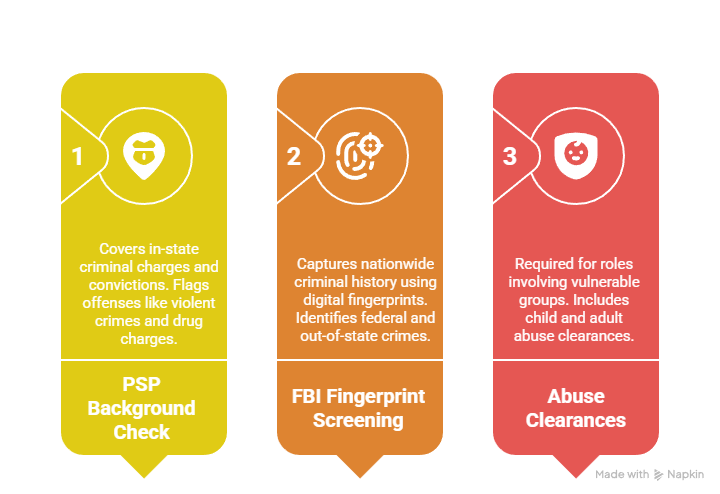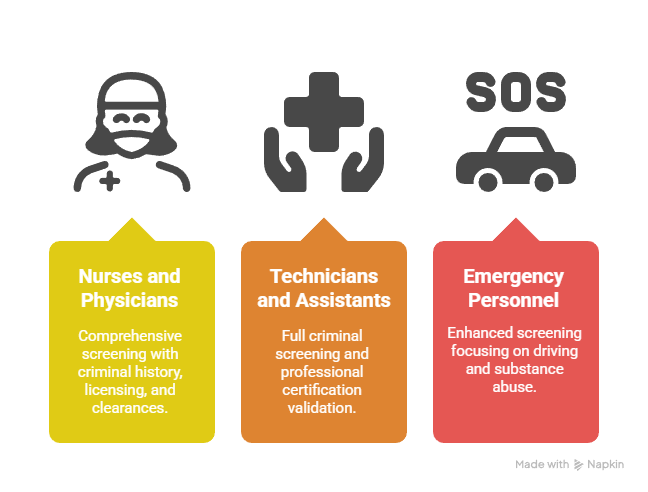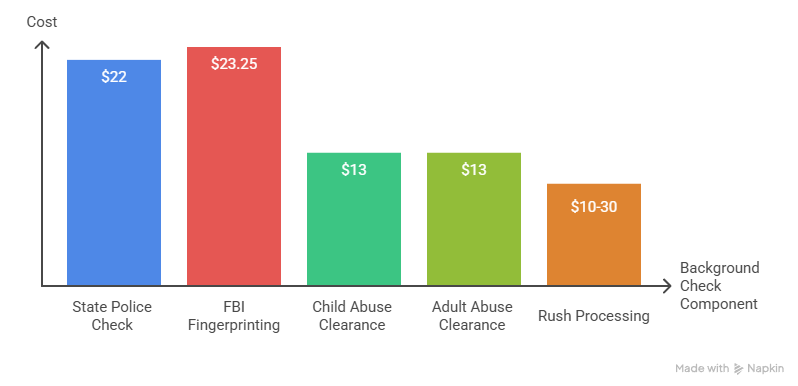Pennsylvania requires comprehensive healthcare background checks under Act 73. The Department of State (DOS) mandates criminal history verification, licensing validation, and employment review. These screenings protect vulnerable patients while maintaining high standards for all healthcare positions.
Key Takeaways
- Pennsylvania healthcare background checks encompass three critical components: criminal history verification through state and federal databases, professional licensing validation, and comprehensive employment history review to ensure workforce integrity.
- Act 73 compliance requires regular renewal cycles every 60 months for most healthcare positions, with stricter requirements for roles involving vulnerable populations such as children or elderly patients.
- The Department of State (DOS) oversees all healthcare background screening processes through the Bureau of Professional and Occupational Affairs (BPOA) and specialized licensing boards for different healthcare professions.
- Position-specific requirements vary significantly between direct patient care roles (nurses, physicians), administrative positions (medical records, office management), and support services (housekeeping, dietary, volunteers).
- Background check costs typically range from $20-$50 per clearance type, with complete screening packages reaching $150+ when including all required state, federal, and abuse clearances.
- Digital processing and interstate licensing compacts are streamlining background verification while maintaining security standards, with AI-enhanced systems reducing processing times from weeks to days.
Understanding Pennsylvania Healthcare Background Check Requirements
Pennsylvania healthcare background checks protect patients and ensure qualified professionals enter the workforce. The Department of State (DOS) mandates these screenings under strict guidelines. Healthcare facilities must comply to maintain licenses and protect vulnerable populations.
The screening process involves three verification systems. Criminal background checks identify safety risks. Professional credential validation confirms competency. Employment history assessment verifies experience and conduct patterns. Each component creates a complete profile of healthcare worker suitability.
Act 73 targets positions with direct contact to vulnerable populations. This includes children and elderly patients requiring specialized care. The law establishes mandatory screening protocols with strict penalties for non-compliance. Violations result in facility sanctions and employment disqualification.
Criminal History Verification Process

Pennsylvania State Police Background Checks
Pennsylvania State Police checks form the foundation of healthcare screening. Applicants submit requests through the official PSP website or processing centers. They must provide complete identification and employment history.
The state database reveals all criminal charges within Pennsylvania. This includes convictions, pending cases, misdemeanors, and felonies. Processing takes 3-5 business days for standard requests. Expedited services are available for urgent staffing needs.
The system flags specific offenses for additional review. These include violent crimes, theft, drug charges, and incidents with vulnerable populations. Employers evaluate each offense based on job relevance, severity, time elapsed, and rehabilitation evidence.
Federal FBI Fingerprint Screening
FBI fingerprint checks provide national criminal history information. Digital fingerprinting ensures accurate identification across all 50 states. This screening is crucial for healthcare workers with multi-state backgrounds.
Federal screening identifies interstate criminal activity and federal offenses. It captures charges outside Pennsylvania's jurisdiction. All positions involving patient contact require FBI clearances. This includes roles with medication access or medical information handling.
Results arrive within 7-14 business days. Peak periods and additional verification may cause delays. Healthcare facilities must plan accordingly for hiring timelines.
Child and Adult Abuse Clearances
Pennsylvania requires specialized abuse clearances for healthcare positions involving vulnerable populations, with separate screenings for child abuse history and adult/elder abuse records.
| Clearance Type | Required Positions | Validity Period | Renewal Process |
| Child Abuse | Pediatric care, family practice, all positions with minor contact | 60 months | Online renewal 60 days before expiration |
| Adult Abuse | Elder care, disability services, home health, assisted living | 60 months | Paper or online renewal with updated information |
Child abuse clearances specifically examine Department of Human Services records for substantiated allegations of child maltreatment, neglect, or endangerment. Adult abuse clearances focus on elder abuse, disability services violations, and neglect cases involving vulnerable adult populations.
Professional Licensing Verification Standards
Pennsylvania verifies that healthcare professionals maintain current, valid licenses. The Department of State manages databases for all healthcare professions. This includes nurses, physicians, therapists, and technicians.
Verification confirms three key elements. First, active license status. Second, disciplinary history. Third, continuing education compliance.
Each profession has unique requirements. Renewal cycles vary. Disciplinary procedures differ. Employers must understand these distinctions.
Disciplinary actions require special attention. Sanctions may not show in criminal checks. Yet they significantly impact employment eligibility. Employers must examine suspension records, malpractice settlements, and peer review sanctions.
Multi-state licenses add complexity. Verification is needed across all jurisdictions. Direct contact with licensing boards confirms current status. It also identifies pending investigations.
Interstate Licensing Compact Considerations
The Enhanced Nurse Licensure Compact (eNLC) enables multistate practice. The Interstate Medical Licensure Compact (IMLC) serves similar purposes. Both maintain strict background check standards.
Multistate license holders face enhanced requirements. Criminal background standards are uniform. Ongoing monitoring is mandatory. Disciplinary actions are reported across all member states.
Employers must verify enhanced standards are met. Criminal checks must be current. Disqualifying offenses must be properly identified. Centralized databases help, but employer responsibility remains.
Employment History Validation Requirements
Comprehensive employment history validation involves verifying previous healthcare positions, confirming job responsibilities, and evaluating professional conduct patterns over time. Healthcare employers must contact previous supervisors, human resources departments, and professional references to validate resume information and identify any performance concerns or policy violations. This process reveals patterns of professional behavior that may not appear in criminal or licensing checks but could impact patient safety and workplace dynamics.
Reference verification should include specific questions about:
- Clinical competency and technical skill demonstration
- Teamwork abilities and interpersonal communication
- Policy compliance and adherence to protocols
- Disciplinary actions or performance improvement plans
- Attendance patterns and reliability indicators
Documentation from previous employers helps establish patterns of reliability, professional growth, and commitment to healthcare excellence standards.
Educational Credential Verification
Healthcare positions require verification of educational credentials from accredited institutions, professional certification programs, and continuing education providers. Employers must confirm that degrees, certificates, and specialized training credentials are legitimate and meet position requirements. This verification process involves direct contact with educational institutions, examination of official transcripts, and validation of professional certification through recognized credentialing organizations.
Educational fraud in healthcare settings poses significant risks to patient safety and organizational liability, making thorough credential verification essential for all healthcare positions. Employers should maintain detailed documentation of all verification efforts and retain copies of official transcripts and certification documents in employee personnel files.
Pennsylvania Act 73 Compliance Framework
Pennsylvania Act 73 establishes comprehensive background check requirements specifically designed to protect children and vulnerable adults in healthcare settings. This legislation mandates that healthcare facilities conduct thorough background screenings for all employees, volunteers, and contractors who may have direct contact with patients under 18 years of age or vulnerable adult populations. The Act creates specific timelines, renewal requirements, and compliance monitoring systems that healthcare organizations must implement and maintain.
Act 73 compliance involves:
- Understanding position-specific screening requirements
- Managing renewal cycles to prevent clearance lapses
- Maintaining detailed documentation for regulatory audits
- Establishing internal tracking systems for clearance expiration dates
- Implementing provisional employment protocols when appropriate
Violations can result in facility sanctions, individual employment termination, and potential legal liability for patient safety incidents.
Renewal and Maintenance Requirements
Background check clearances under Act 73 require regular renewal to maintain validity, with most components requiring updates every 60 months.
| Clearance Component | Renewal Frequency | Advanced Notice Required | Processing Time |
| PA Criminal History | 60 months | 90 days | 5-10 business days |
| FBI Fingerprint Check | 60 months | 90 days | 10-14 business days |
| Child Abuse Clearance | 60 months | 60 days | 7-10 business days |
Healthcare facilities must establish systematic renewal tracking to prevent clearance lapses that could result in immediate employment suspension. Many organizations implement automated reminder systems, assign renewal responsibilities to specific staff members, and maintain backup coverage plans for positions requiring continuous staffing.
Position-Specific Background Check Requirements
Healthcare background check requirements vary significantly based on job responsibilities, patient contact levels, and access to sensitive medical information or controlled substances.
Direct patient care positions requirements:

- Registered nurses, physicians, therapists: Most comprehensive screening including all criminal history checks, professional licensing verification, and specialized clearances
- Medical technicians and clinical assistants: Full criminal screening plus professional certification validation
- Emergency medical personnel: Enhanced screening with emphasis on driving records and substance abuse history
Administrative healthcare positions typically require modified background screening focused on trustworthiness, reliability, and information security compliance. While these roles may not involve direct patient care, they often provide access to sensitive health information protected under HIPAA regulations.
Support service positions such as dietary staff, housekeeping personnel, and maintenance workers require basic criminal background screening and reference verification appropriate to their facility access levels and patient interaction potential. Even though these roles may seem removed from clinical care, they often involve unsupervised access to patient areas requiring careful screening.
Healthcare Volunteer Background Requirements
Healthcare volunteers must complete background screening processes similar to paid employees, though some fee waivers may be available for volunteer positions.
Volunteer screening categories:
- Direct Patient Contact: Full background screening equivalent to paid staff, including criminal history, abuse clearances, and health screening requirements
- Administrative Support: Modified screening focusing on reliability, trustworthiness, and basic criminal background without extensive employment history validation
- Special Event Volunteers: Limited screening appropriate for one-time or occasional events with supervised activities and restricted facility access
Volunteer background screening must be documented and maintained according to the same standards as employee records, with regular updates and renewal requirements based on volunteer service duration and responsibilities.
Department of State Oversight and Regulatory Framework
The Pennsylvania Department of State (DOS) maintains comprehensive oversight of healthcare background check processes through the Bureau of Professional and Occupational Affairs (BPOA) and specialized professional licensing boards. This regulatory framework establishes minimum standards for background screening, monitors compliance through facility inspections and audits, and enforces penalties for violations that compromise patient safety or regulatory compliance.
DOS oversight includes regular facility inspections that examine background check documentation, review employee files for compliance completeness, and assess organizational policies and procedures for maintaining current clearances. Inspectors evaluate whether facilities have appropriate systems for tracking clearance expiration dates, managing renewal processes, and ensuring that employees do not work beyond their authorized clearance periods. Non-compliance findings can result in facility sanctions, corrective action requirements, and ongoing monitoring until full compliance is achieved.
Professional Board Coordination
Individual healthcare professional licensing boards work in coordination with DOS oversight to ensure comprehensive background screening and ongoing professional monitoring. The State Board of Nursing, State Board of Medicine, and other specialized boards maintain discipline databases, monitor continuing education compliance, and investigate complaints that may impact professional standing. Healthcare employers must coordinate with relevant professional boards when conducting background checks and ongoing employee monitoring.
Professional boards provide resources for employers to verify current license status, review disciplinary history, and understand profession-specific requirements that may impact background screening decisions. Board coordination ensures that background check processes align with professional standards and that any disciplinary actions or license restrictions are properly considered in employment decisions.
Background Check Processing Timeline and Procedures
Pennsylvania healthcare background check processing involves multiple agencies and databases, creating a complex timeline that healthcare employers must carefully manage to ensure timely hiring without compromising thoroughness. The complete process typically requires 4-6 weeks from initial application submission to final clearance receipt, though individual components may process at different rates depending on database accessibility, verification requirements, and seasonal processing volumes.
Initial application submission through the Pennsylvania Department of State online portal requires accurate personal information, complete employment history, and proper documentation to avoid processing delays. Applicants must ensure that all identifying information matches exactly across different screening components, as discrepancies can trigger additional verification requirements that extend processing timelines. Digital fingerprinting appointments must be scheduled promptly, as availability may be limited in certain geographic areas or during peak hiring seasons.
Expedited Processing Options
Critical healthcare staffing situations may qualify for expedited background check processing, though availability and criteria vary by screening component and processing agency.
| Screening Component | Standard Processing | Expedited Processing | Emergency Processing |
| PA Criminal History | 5-7 business days | 2-3 business days | Same day (limited availability) |
| FBI Fingerprint Check | 10-14 business days | 5-7 business days | Not available |
| Child Abuse Clearance | 7-10 business days | 3-5 business days | Same day (critical need only) |
| Professional License Verification | 3-5 business days | 1-2 business days | Same day verification possible |
Healthcare facilities should establish relationships with background screening vendors who can coordinate multiple components and provide status updates throughout the process.
Common Disqualifying Factors and Risk Assessment
Healthcare background checks identify various disqualifying factors that may prevent employment or require additional risk assessment before making hiring decisions. Automatic disqualifiers typically include violent felony convictions, sexual offenses, crimes against vulnerable populations, and drug trafficking charges that directly relate to patient safety concerns. However, many background check findings require individualized assessment considering factors such as offense severity, time elapsed since conviction, evidence of rehabilitation, and relevance to specific job responsibilities.
Professional licensing disciplinary actions represent another category of disqualifying factors that require careful evaluation. License suspensions, malpractice settlements, continuing education violations, and peer review sanctions may indicate professional competency concerns that impact patient safety. Healthcare employers must evaluate these findings in conjunction with criminal background information and employment history to make informed hiring decisions that balance individual circumstances with organizational risk tolerance.
Risk Assessment Framework
Healthcare organizations should establish systematic risk assessment frameworks for evaluating background check findings that do not automatically disqualify candidates but raise potential concerns.
Risk assessment criteria:
- Offense Relevance: Direct relationship between identified issues and job responsibilities, patient safety concerns, or access to vulnerable populations and controlled substances
- Temporal Factors: Time elapsed since incidents, patterns of behavior over time, and evidence of sustained positive conduct following any identified problems
- Rehabilitation Evidence: Completion of treatment programs, professional development activities, positive employment references, and community service or volunteer activities
- Position-Specific Risks: Level of patient contact, access to medications or medical devices, supervision availability, and organizational capacity for ongoing monitoring
Risk assessment should involve multidisciplinary review teams including human resources professionals, clinical supervisors, risk management specialists, and legal counsel when appropriate.
Cost Structure and Financial Considerations

Pennsylvania healthcare background checks involve multiple fees that can total $150-$200 per candidate when all required components are included. Pennsylvania State Police criminal history checks cost $22, FBI fingerprint processing requires $23.25, child abuse clearances cost $13, and adult abuse clearances require $13. Professional license verification may involve additional fees depending on verification methods and expedited processing requirements.
Healthcare employers typically bear background check costs as part of their hiring process, though some organizations pass costs to candidates, particularly for contract or per diem positions. Cost allocation should be clearly communicated during the hiring process to avoid candidate confusion or withdrawal. Organizations with high hiring volumes may negotiate reduced rates with background screening vendors or establish internal processing capabilities to manage costs more effectively.
Additional costs may include expedited processing fees ranging from $10-$30 per component, digital fingerprinting service charges, and vendor fees for coordinated screening services. Healthcare facilities should budget for these expenses and consider cost-effective strategies such as batch processing multiple candidates, negotiating volume discounts, and maintaining relationships with multiple vendors to ensure competitive pricing and service availability.
Budget Planning Strategies
Healthcare organizations should develop comprehensive budget planning strategies that account for background screening costs across all hiring categories.
Budget considerations include:
- Annual hiring projections by position type
- Seasonal fluctuations in hiring needs
- Emergency staffing requirements
- Volunteer screening costs
- Renewal processing expenses
- Technology infrastructure investments
Organizations may consider establishing partnerships with staffing agencies or professional organizations to share background screening costs and resources.
Technology Integration and Digital Processing Advances
Modern healthcare background screening increasingly relies on digital technology platforms that integrate multiple databases, automate verification processes, and provide real-time status updates for pending screenings. Artificial intelligence algorithms can quickly analyze criminal history patterns, identify potential red flags requiring human review, and flag inconsistencies between different information sources. These technological advances significantly reduce processing times while improving accuracy and completeness of background screening results.
Biometric authentication technology ensures accurate candidate identification throughout the screening process, preventing identity fraud and ensuring that background check results correspond to the correct individual. Digital fingerprinting systems provide higher quality prints than traditional ink methods, reducing rejection rates and reprocessing delays. Automated database queries can simultaneously search multiple information sources, providing comprehensive results more efficiently than sequential manual searches.
Blockchain technology shows promise for creating tamper-proof credential verification systems that could revolutionize professional licensing validation and continuing education tracking. Healthcare organizations are beginning to explore blockchain applications for maintaining permanent, verifiable records of employee credentials, training completions, and background screening results that can be securely shared across organizations and licensing authorities.
Data Security and Privacy Protection
Healthcare background screening technology must comply with stringent data security requirements including HIPAA privacy protections, state confidentiality laws, and cybersecurity best practices.
Security measures include:
- Encryption protocols for data transmission and storage
- Multi-factor authentication for system access
- Regular security audits and vulnerability assessments
- Incident response planning and breach notification procedures
- Vendor compliance certifications and insurance coverage
Cloud-based screening platforms offer scalability and accessibility advantages but require careful evaluation of security measures, data residency requirements, and vendor compliance certifications.
Interstate Licensing and Professional Mobility
Healthcare professional mobility across state lines requires understanding complex interstate licensing agreements and their associated background check requirements. The Enhanced Nurse Licensure Compact (eNLC) allows qualified nurses to practice in multiple member states under a single multistate license, but requires enhanced background screening that exceeds standard single-state requirements. Similar compacts exist for other healthcare professions, each with specific background check standards and ongoing monitoring requirements.
Interstate license holders must maintain compliance with enhanced background check standards including more frequent renewal cycles, automatic disqualification for certain offense categories, and ongoing criminal history monitoring through automated systems. Healthcare employers hiring professionals with interstate licenses must verify that background checks meet compact requirements and understand any restrictions or limitations on practice authority in specific states.
Multistate License Verification
Multistate license verification requires coordination with multiple professional licensing boards and compact administrative systems to ensure comprehensive background screening.
Interstate compact verification requirements:
- Enhanced Criminal Background: More restrictive offense categories and shorter renewal cycles compared to single-state licenses
- Multistate Monitoring: Automatic notification systems for criminal charges or disciplinary actions in any member state
- Coordinated Disciplinary Action: Enforcement actions in one state impact practice authority across all member states
- Uniform Standards: Consistent background check requirements across member states
- Technology Integration: Advanced database systems providing real-time license status verification
Healthcare organizations employing multistate license holders should establish systems for monitoring ongoing compliance and receiving notifications of any changes in license status or background screening requirements.
Conclusion
Pennsylvania healthcare background checks represent a comprehensive regulatory framework essential for maintaining patient safety and professional standards across all healthcare settings. The multi-layered screening process creates robust protection for vulnerable patient populations while ensuring qualified professionals can pursue healthcare careers. Understanding Act 73 requirements, DOS oversight responsibilities, and position-specific screening criteria enables healthcare organizations and individual professionals to navigate these requirements effectively while maintaining compliance with evolving regulatory standards.
Frequently Asked Questions
How long are Pennsylvania healthcare background check clearances valid?
Most Pennsylvania healthcare background check clearances are valid for 60 months (5 years) from the date of issue. However, some positions may require more frequent renewals, and healthcare professionals should begin the renewal process 60-90 days before expiration to avoid any lapse in clearance that could affect employment eligibility.
Can healthcare workers start employment while background checks are still processing?
Limited provisional employment may be possible for certain healthcare positions while background checks are processing, but this requires employer approval and strict supervision. Provisional employees typically cannot have unsupervised patient contact, access controlled substances, or perform high-risk procedures until all background screening components are completed and approved.
What criminal offenses automatically disqualify someone from Pennsylvania healthcare employment?
Automatic disqualifiers typically include violent felony convictions, sexual offenses, crimes against children or vulnerable adults, drug trafficking charges, and convictions for healthcare fraud. However, each case requires individual assessment considering factors such as offense severity, time elapsed, rehabilitation evidence, and job-specific requirements.
Are volunteer healthcare workers subject to the same background check requirements?
Healthcare volunteers must complete background screening similar to paid employees, with requirements based on their duties and patient contact levels. Volunteers working directly with patients or vulnerable populations require full screening including criminal history and abuse clearances, though fee waivers may be available for volunteer positions.
How do interstate nursing licenses affect Pennsylvania background check requirements?
Nurses with Enhanced Nurse Licensure Compact (eNLC) multistate licenses must meet enhanced background screening requirements that exceed standard Pennsylvania requirements. These include more restrictive disqualifying offense categories, ongoing criminal history monitoring, and coordinated disciplinary action reporting across all member states.
What happens if a background check reveals issues that don't automatically disqualify a candidate?
Healthcare employers should conduct individualized risk assessments considering the nature and severity of identified issues, time elapsed since incidents, evidence of rehabilitation, and position-specific requirements. This assessment may involve interviews, additional reference checks, and consultation with legal counsel or risk management specialists.
How much do Pennsylvania healthcare background checks typically cost?
Complete Pennsylvania healthcare background screening typically costs $150-$200 per candidate, including Pennsylvania State Police criminal history ($22), FBI fingerprint processing ($23.25), child abuse clearance ($13), adult abuse clearance ($13), and professional license verification fees. Expedited processing adds $10-$30 per component.
Can expunged criminal records affect healthcare employment in Pennsylvania?
Expunged records generally do not appear on standard background checks and should not affect healthcare employment decisions. However, certain healthcare positions may require disclosure of expunged records, and professional licensing boards may have access to sealed or expunged information depending on the specific offense and profession.
How often must healthcare professionals renew their background check clearances?
Pennsylvania healthcare professionals must renew background check clearances every 60 months for most positions. Some high-risk positions or those involving vulnerable populations may require more frequent renewals. Healthcare employers typically track renewal dates and initiate the process 60-90 days before expiration.
What technology improvements are being made to Pennsylvania healthcare background screening?
Pennsylvania is implementing digital processing systems, automated database integration, and AI-enhanced analysis to improve screening accuracy and reduce processing times. Biometric authentication, blockchain credential verification, and real-time monitoring systems are being developed to enhance security and provide ongoing compliance monitoring for healthcare professionals.
Additional Resources
- Pennsylvania Department of State Bureau of Professional and Occupational Affairs
https://www.dos.pa.gov/ProfessionalLicensing/Pages/default.aspx - Pennsylvania State Police Criminal History Record Information
https://www.psp.pa.gov/Pages/CHRI.aspx - Pennsylvania Department of Human Services Child Abuse History Clearance
https://www.dhs.pa.gov/Services/Assistance/Pages/Background-Checks.aspx - FBI Criminal Justice Information Services Background Checks
https://www.fbi.gov/services/cjis/background-checks - Enhanced Nurse Licensure Compact Information
https://www.ncsbn.org/public-files/NLC_Final_050415.pdf - Pennsylvania Act 73 Child Protective Services Law
https://www.legis.state.pa.us/cfdocs/legis/li/uconsCheck.cfm?yr=2014&sessInd=0&act=73 - Interstate Medical Licensure Compact Resources
https://www.imlcc.org/

GCheck Editorial Team
Meet the GCheck Editorial Team, your trusted source for insightful and up-to-date information in the world of employment background checks. Committed to delivering the latest trends, best practices, and industry insights, our team is dedicated to keeping you informed.
With a passion for ensuring accuracy, compliance, and efficiency in background screening, we are your go-to experts in the field. Stay tuned for our comprehensive articles, guides, and analysis, designed to empower businesses and individuals with the knowledge they need to make informed decisions.
At GCheck, we're here to guide you through the complexities of background checks, every step of the way.





